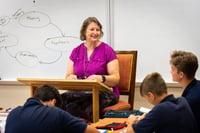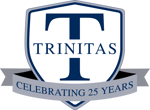 The pursuit of wisdom consists of basic things: reading boni libris, competing with a charitable heart on the field, turning in commonplace books, parsing Latin and Greek, working out complex Calculus problems, reciting poetry, memorizing Scripture, crafting essays, exercising your vocal cords in choir, and submitting your best art (even if you don’t think you’re much of an artist). Well, maybe it is better to say that these are the concrete ways you will pursue those lofty aims advocated by Aristotle, namely phronesis and techne. Both of them are arts aimed at the cultivation of the soul, phronesis meaning moral virtue, and techne meaning skilled virtue. Morals and skills. Or to use Paul’s language, “by the mercies of God, that you present your bodies a living sacrifice, holy, acceptable to God, which is your reasonable service. And do not be conformed to this world, but be transformed by the renewing of your mind, that you may prove what is that good and acceptable and perfect will of God” (Romans 12:1-2).
The pursuit of wisdom consists of basic things: reading boni libris, competing with a charitable heart on the field, turning in commonplace books, parsing Latin and Greek, working out complex Calculus problems, reciting poetry, memorizing Scripture, crafting essays, exercising your vocal cords in choir, and submitting your best art (even if you don’t think you’re much of an artist). Well, maybe it is better to say that these are the concrete ways you will pursue those lofty aims advocated by Aristotle, namely phronesis and techne. Both of them are arts aimed at the cultivation of the soul, phronesis meaning moral virtue, and techne meaning skilled virtue. Morals and skills. Or to use Paul’s language, “by the mercies of God, that you present your bodies a living sacrifice, holy, acceptable to God, which is your reasonable service. And do not be conformed to this world, but be transformed by the renewing of your mind, that you may prove what is that good and acceptable and perfect will of God” (Romans 12:1-2).
Your scholarly endeavors this year put you in the position of making moral choices and exercising skills, all in the knowledge that God has called you to transformation and sacrifice. An important labor, indeed. These manifest labors, those things I listed a moment ago, are ultimately in service to the metaphysical labor. You are here to chase wisdom. Not to casually acquire “stuff” or “information” so that you might one day lay claim to some social clout that you think will matter. You are here to pursue the fear and admonition of the Lord.
But make no mistake, this chase will require you to work hard, to sweat, and to face the almost certainty of missing the mark at times. This is not something to dissuade you, but something to remind you that anything worthwhile is hard. Each of you understands this intrinsically, and you could rattle off a number of things you’ve had to work hard to achieve. Sporting victories, musical skills, your first job, etc., etc., etc. Of course, it is possible for us to give ourselves to the things that don’t last because they seem easy. But even binge-watching your favorite Netflix show over the weekend, instead of working on that Traditio assignment that is due soon, requires a certain amount of commitment. And the cost of such a choice will make things harder down the road, meaning all that we do when we take the shortcut in our pursuit is to delay the real work that will still be required of us. Pursuing wisdom is hard; making the right moral choice is hard; acquiring the skills offered to you each day is hard. And any attempt to make it easy will only lead you to a kind of poverty.
What kind of poverty? you ask. The Reverend James V. Schall writes of “intellectual poverty” which primarily consists in the “refusal to ask the fundamental questions of life—about creation, death, freedom, sin, redemption, virtue—together with an unwillingness to listen to the answers, including the revelational answers, to these questions” (On the Unseriousness of Human Affairs 94). Intellectual poverty. Not stupidity. Not a lack of ability. Schall is suggesting that we are made poor, deprived of the riches available to us, is we don’t ask the essential questions of life. And that is really the key to your pursuit of wisdom this year. What questions will you ask? Will they be the kind that impoverishes yourself and your neighbor? Or will you opt for silence, hoping that by saying nothing you’ll still gain something somehow, in a kind of osmosis? Here are two suggestions that will help you truly pursue wisdom this year by helping you craft the right kind of questions.
Believe that those older than you have something good to give you.
Consider the kinds of questions you ask your teachers. Are you asking questions about their personal life because you don’t find Boethius riveting? Do you overcomplicate your question because you want to prolong a particular math problem, thus putting off moving on? Every conversation you have with someone older than you is an invitation to a kind of time travel, where the past comes to bear upon you in the present in order that your future might be different than it was otherwise aiming to be. Trust your parents. Trust your teachers. The results may surprise you.
Read things that aren’t merely enjoyable.
You attend a classical school, which means you read good books all the time. Typically, because we make you. What a student chooses to read on their own shows a great deal about the kinds of questions you’re going to ask in class. Do you see a book of poetry and instinctively pick it up to read a few lines? If you’re only reading poetry when it’s part of a class recitation, your imaginations (and your writing) will show it. Do you rush home to pick up where they left off in the hottest new young adult fantasy vampire steampunk wizarding series? Even a compelling story, if told in poorly constructed prose, will ultimately hamper your wordplay as time goes on. Notice this isn’t a list of things to avoid. Rather, this is a reminder that C. S. Lewis’s advice, to read at least one old book for every two modern ones, comes from a place of wisdom. And your reading outside of the classroom this year will shape you more than you can know now.
Simple things. Ask essential questions. Trust your elders. Read good books. This is what it means to pursue wisdom. We seek to be both moral and skilled. Solomon says it like this:
“Do not forsake [Wisdom], and she will preserve you; Love her, and she will keep you. Wisdom is the principal thing; Therefore get wisdom. And in all your getting, get understanding” (Proverbs 4:6-7).


